One of the most eventful trips that I took while in Russia was, naturally, to a different country, Poland. It was early January. I had just finished a large translation project. Classes would be out until early February. The dormitory was empty, and I was looking for something to do with myself that would make me feel a little more alive.
My first impression of Gdansk was one of overwhelming despondency. This was because I was still in Moscow when the trip nominally began. The express train from downtown Moscow to the airport works just fine (it is even quiet, and it does not rock from side to side), but it is located in Russia, as a result of which it takes one past cluster after cluster of grey, identical apartment buildings. One of the principal functions of the Soviet government, under which these apartment complexes were erected, seems to have been to suck the joy out of people’s lives. In my estimation, its practitioners succeeded.
My first reminder of why I was leaving Russia (if temporarily) came in the airport. Instead of taking one’s shoes off and passing them through sensory detectors on a conveyor belt like in much of the rest of the world, in Russian airports one puts little plastic wrappers, see-through, like cellophane, on one’s shoes, walks through a metal detector, and discards the wrappers. There are plastic bins where one picks up one’s carry-on bags for ease of disposal; in an especially developed country, there might be recycling bins. Nothing doing in Russia, though: recycling bins or not, Russians see fit to take their shoe wrappers off and throw them on the floor, scattering them across the entire entrance to the gates, as to put them in the bins would require their moving an entire one or two metres from where they stand.
My arrival in Gdansk was delayed by my first flying to Kaliningrad, where I stayed with a friend’s parents, to save money. The sky there was beautiful, but I was still in Russia. I had an obscenely early bus ride to Gdansk, as there are no buses there during the day, and, whatever I say about the Russian people, Russian culture, and so forth, my friend’s father got up at dawn to drive me to the station and cordially saw me off. In the dead of winter, when I was disenthralled with the entire world, I would have claimed that this man was clearly a foreigner who was merely pretending to be Russian, but, in fact, there are a great many wonderful people in Russia, and I was lucky to meet two of them in Kaliningrad.
Of my bus ride to Gdansk I remember less than I would have liked, as my interrogation at the border was interesting. I sat down with a man of about my age who wanted to figure out what I had been doing in Russia and why I was leaving. He asked a few questions about my parents’ names and occupations, the address of the dormitory in which I lived, the name of the institute at which I studied, and, when I told him that I studied literature, who a few of my favourite writers were. He relaxed pretty quickly, having determined that I was genuinely just a student of literature—he chatted with me about prison literature, claiming that Varlam Shalamov was a better writer than Alexander Solzhenitsyn, and asked me if I had a Russian girlfriend. As I passed through the turnstile leading from Russia to Poland and got my passport back from the border guard, the man who had interrogated me shook my hand and said, “If I am here when you pass back into Russia, I hope that I get to talk to you again. You are a very interesting person.” He then strode off somewhere, and I hurried onto the bus, whose driver had, kindly, waited for me, to the reproachful stares of people waiting to catch flights and attend to other commitments in Poland.
I distinctly remember arriving at Gdansk’s bus station, which is behind the train station and affords a decent view of the city’s old town. Two people separately asked me, when they saw me looking at my map, if I needed help finding something, and those walking past me shared the sidewalk like—get this—civilised human beings. Cars stopped at red lights and crosswalks and did not even try to nudge one with their bumpers. The morning streets were quiet, the sea air crisp. I stopped off at a bakery and had my first real pastry in months.
The next few days were a revelation for me. I talked to Europeans. I visited a museum that told the story of Russia’s violent suppression of Polish protests over poor pay, rights, and working conditions in 1980 (Russians insist that they were helping the Poles, just as they helped the Czechs, Hungarians, and every other people under their thumb following World War II). I wrote to a friend, just as I wrote on my blog a few days ago, that Poland’s honest dialogue about the past would be impossible in Russia. Polish people build cities with clean streets and punctual, reliable trains. They work toward the good of society and treat one another like human beings. They even base their current identity on their past and are proud of their country’s history. I would argue that Russia lacks all of these qualities and will leave it to the country's citizens to prove me wrong.
One of the most interesting people whom I met in Gdansk was a hostel employee born in the early 1990s. She had family in the west of Germany and said that, as a kid, she had never understood why people smiled at one another, struck up conversations in grocery stores, helped one another with their bags, and would sometimes cede their place in line. It was only as time passed and Poland started to recede from its Soviet past that she realised that this was exactly what life was supposed to be like.
I met a Frenchman, with whom I got on well (it turns out that people from kindred cultures can often find something to talk about), who travelled often through Eastern Europe in the low season to save money and see more of the world than he could do in the west of Europe. I also met someone from, I think, Taiwan (I honestly cannot remember), who explained that people were kinder in the north of Poland, if memory serves, than in the south and that they looked askance at Asians, even those who had lived there for many years.
I ate like a king. I learned that Gdansk had grown rich both of as part of a major trade route and because of its stores of amber. Malbork, a nearby city (which has parts of its town wall still intact), has the largest brick castle in all of Europe, I believe, and was the site of an outpost of some 13th-century organisation connected with Lubeck, then a major kingdom, and the spread of Christianity before changing hands several times (the Lithuanian Empire probably conquered it at some point) and eventually being trashed in World War II. Gdansk itself was also trashed, but, like Malbork, it was carefully restored following the war, and its entire historic centre looks to me as though it were five hundred years old. I have read, however, that its architecture was redone to look Flemish so as to eschew the city’s previous assocations with Germany.
Having managed to see everything of note (within my budget—I eschewed the more expensive museums) in Gdansk and taken a day-trip to Malbork within two days, I had a free third day that I spent writing letters to friends about my inner turmoil and how much Russia sucked. I could see part of Gdansk’s old defensive wall through the hostel window by which I sat. Heavy, wet snow was falling in flurries. I stepped out for a cheap lunch of dumplings, pork chops, and vegetable soup and went for a walk across the river. I was again struck by Gdansk’s quiet. The sun was starting to set weakly over the water, barely colouring it. The sky quickly bled out its light, and I walked back in a sort of ecstasy through the dark, snowy early evening.
My interrogation on the way back into Russia was dodgier than the one going in. For one thing, I did not have my migration card. The head of international relations instilled in all of us foreign students that we should never for one second part ways with it, but the Russians take it away when one crosses the border and give it back only when one returns. Since one does not much know how this process works—how are they sure to be able to give you back the same one when you reenter the country? What if you reenter through a different border crossing?—foreigners like myself tend to worry about never getting it back. (Russian immigration laws are tricky. Even temporary visitors to the city need both a migration card, which says for how long they are allowed to stay in Russia, and a registration card, which demonstrates that they officially live in this or that city within the country. Russians themselves have both “internal” and “external” passports, the former as standard-issue ID, and the latter for travel outside of the country. At least we do not have that.)
That being said, I wanted to get my migration card back, and I was not sure how to go about doing it. The man who interviewed me this time was clearly younger than the first one, and he made sure to ask me every question that a border guard is supposed to, glancing frequently at the protocol in front of him so as not to get anything wrong.
“What is your name?” he asked. “What do your parents do for a living?” I told him. He asked if I was married, had kids, or had ever been to prison. I did not know the answer to every question (“How much money do your parents earn each year? Where is the literary institute located?”), and so I made them up. When the interrogator asked me what I thought of Vladimir Putin’s foreign policy, I told him that I agreed with it entirely. “What about the recent events in the Crimea?” he said. “What is your position with regards to them?” I told him that I supported Russia’s takeover of it, as the people had, after all, voted. “So you support the referendum,” he said, and I nodded.
I was eventually released from the interrogation room and given back my cherished migration card. My first impression of Kaliningrad was, naturally, of its sucking. When I went to ask someone which bus to take to the airport, she told me to look at the schedule myself. I checked it and asked a second person to the same effect, at which point I left the station and was almost hit by someone running a red light. I wandered the streets looking for an old city gate, which I probably found, then headed for Emmanuel Kant’s grave by the city’s old cathedral, which I definitely found. Kaliningrad was reduced to rubble during World War II, and the Russian government did not take the trouble to restore its historic centre. The highlight of my trip was finding a Spar, a German supermarket with outlets all over the place, where I bought cheap sausage, bread, and, perhaps, something else, and finding a free washroom, an extreme rarity in Russia, in a shopping mall across the street from the bus station.
My flight back to Moscow was delayed by something like an hour, after which, when the boarding call was announced, everyone tried to crowd through the gates all at once, as Russians have neither discovered the line, nor learned that having people board by groups is more efficient than having them stampede the ticket counter. I was given dinner on the way back, as I had been on the way there. I remember arriving by express train and feeling superior to a couple of tourists who did not speak Russian. We all got off, dispersing across the square outside of the train station, and I descended into the subway to live out the rest of the Russian winter.
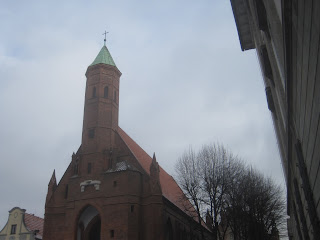 |
| This church looks suspiciously non-Russian. |
 |
| An old building, also non-Russian, in Gdansk. |
 |
| The Poles take their pastries seriously. |
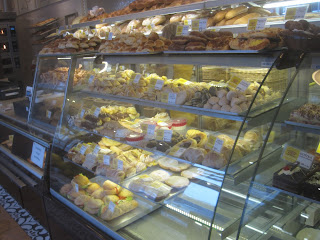 |
| This one pastry shop had two whole sections! |
 |
| An observation tower from the old city wall. |
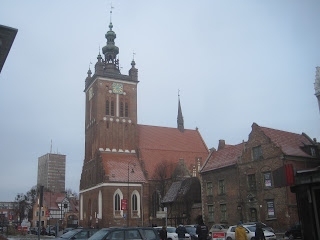 |
| This looks like a town hall, but it is probably a church. |
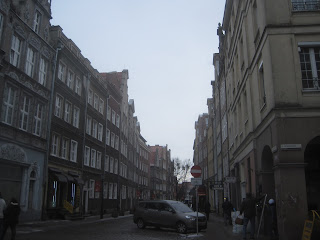 |
| Old buildings in Gdansk's city centre. |
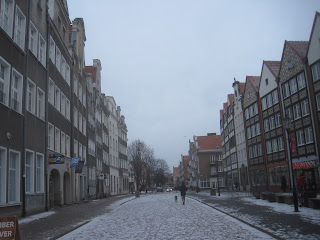 |
| As above. It had a lot of these. |
 |
| The famous weighing house (or crane, or something). |
 |
| More old houses. Look at them! |
 |
| As above--plus some sort of church, it appears. |
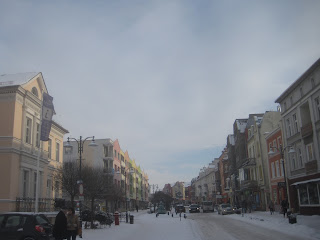 |
| The snowy streets of Malbork in early January. |
 |
| The faint winter light. |
 |
| A small part of Malbork Castle. |
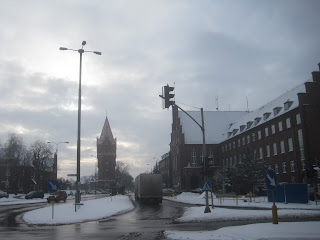 |
| Old buildings in Malbork. |
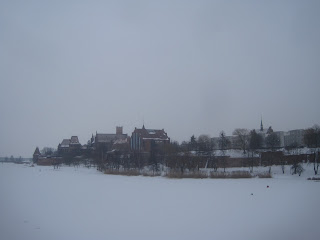 |
| Part of the castle territory from across the water. |
 |
| A large section of it, if I am not mistaken. |
 |
| Gdansk again. Perhaps the best shot of old (restored) buildings. |
 |
| Awesome evening light over the city. |
 |
| A clear day (the next day, I think). |
 |
| Twilight's falling. |
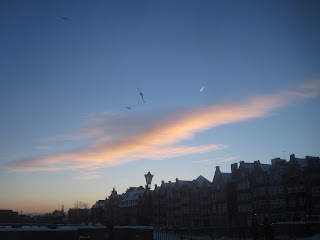 |
| The start of the sunset, as seen from over the water. |
 |
| Twilight has now definitely fallen. |
 |
| There is barely any daylight left. |
 |
| The moon above a less historic section of Gdansk. |
 |
| Back in the USSR on my way to Moscow. |
 |
| I am not actually sure who this is. |
 |
Kaliningrad's only tourist attraction (besides its airport,
which enables one to leave). |




























No comments:
Post a Comment